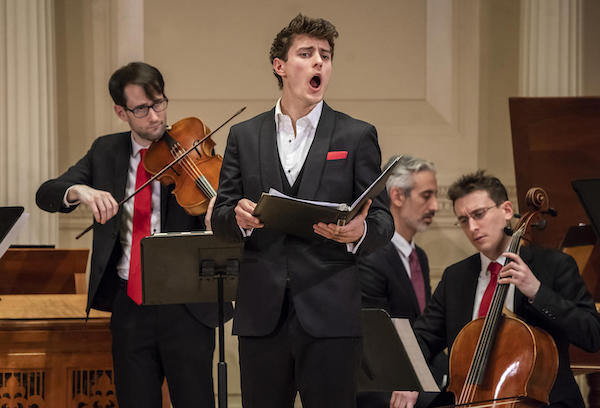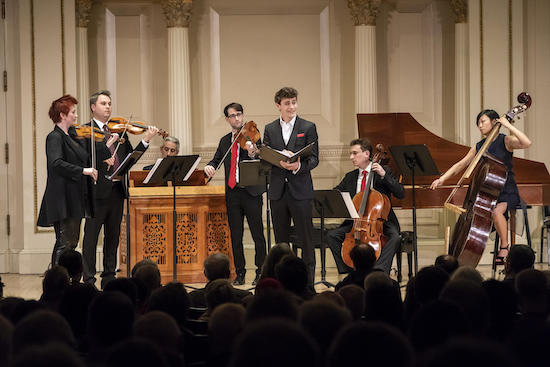Orliński brings a striking voice and admirable artistry to Weill Hall

Jakub Józef Orliński performed at Weill Recital Hall Thursday night. Photo: Stephanie Berger.
A countertenor recital doesn’t often generate as much buzz as the one that Jakub Józef Orliński gave at Carnegie Hall on Thursday night. Certainly, the Polish singer has an intriguing and unusual biography, working as a model and break dancing “in his spare time.”
Yet his appearance in Weill Hall, with the period performance ensemble New York Baroque Incorporated, showed that his exceptional voice and musical sense deserve plenty of attention on their own.
The program started with a lovely, softly emotional account of Vivaldi’s Stabat Mater. Orliński doesn’t have the aggressive shine typical of many countertenors; this is a firm, warm sound with a range of colors, and in the lower reaches of Vivaldi’s writing he showed a dark-grained blend. He has a bright bloom at his top, though, as displayed in “Quis non posset contristari.” Overall, Orliński’s singing is marked by impressive control, with a natural lightness and ease into which he can quickly inject vocal intensity.
The musicians of New York Baroque had an inconsistent night, in spite of some moments of excellent work. Their accompaniment of the Vivaldi was wiry, with the violins sounding especially shrill. More successful were Corelli’s Trio Sonata in D Major (Op. 3, No. 2), where the sighing voices of the strings weaved beautifully through each other, and the accompaniment to “Alla gente a Dio diletta’ from Nicola Fago’s Il Faraone Sommerso, which featured warm, tender cooing in the violins.
The entire program was a showcase of sorts for Orliński’s latest album, “Anima Sacra,” and the second half highlighted lesser-known composers of the late Baroque: Nicola Fago, Francesco Durante, and Domingo Terradellas. Of particular interest were two arias from Gaetano Maria Schiassi’s Maria Vergine al Calvario, a work only recently rediscovered by Orliński’s friend and collaborator Yannis François, and likely not heard in centuries. “A che si serbano” featured virtuosity from the entire company, with a rapid vocal line blazing over sparkling trills in the ensemble. “L’agnelletta timidetta” was striking in its own way, achieving emotional weight with its deep, sighing languor.
Francesco Durante’s Concerto for Strings in G minor, split into two segments, offered more chances for the instrumentalists to shine. The Presto of the first movement showed admirable fire, though the violin playing was again rough, with muddled runs and blocky chords. The later movements fared better, offering dreaming pulses in the Largo affettuoso and a cheerful pesante romp in the closing Allegro affetuoso.
Orliński seemed to tire a bit in the later stretches of the recital, pinching and straying flat on his high notes. He still managed clarity in his final selection, “Mea tormenta, properate!” from Sanctus Petrus et Sancta Maria Magdalena by Johann Adolph Hasse. As throughout the recital, he impressed with his vocal control, standing out over the crackling, furious accompaniment.
Two encores made for a fine cap to the two-hour evening. The first, “Domine Fili unigente” from Durante’s Mass for Five Voices in C Major, Orliński described as a little scherzo, and indeed it was, playful and exceedingly brief. The second, the more somber “Vedrò con mio diletto” from Vivaldi’s Giustino, provided some of his best singing of the night, a spellbinding rendition given in honor of the celebrated baritone and teacher Sanford Sylvan, who died on Tuesday night.

Photo: Stephanie Berger.



